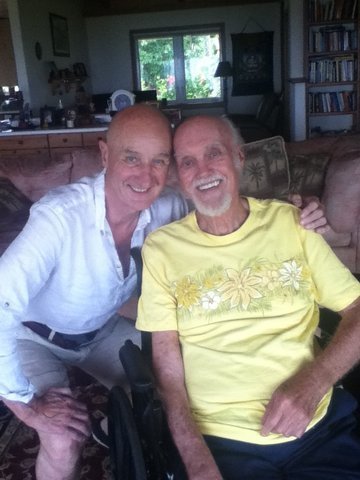
I heard the sound of wheels on the wooden floor before I saw him. We turned to gaze at the open door and down through the corridor. He swung into our line of vision, swiveling his wheelchair around finally to face us in his spacious living room, his back toward a large window with a vista onto the Pacific Ocean in Maui. Ram Dass was beaming, joyous. His legs were thin and useless; his eyes were clear and large, and dancing more than I had ever seen.
I got up to embrace him, feeling the span of 13 years dissolve in an instant -- the 13 years since we had last met. We had run all over Europe together every year for 10 years or more in the '80s and '90s, when I had organized his retreats there and in England. When we weren't sitting in some retreat center we were floating down the Grand Canal in a gondola in Venice, taking the waters in Vichy, or lounging in a country hotel in England. He used to enjoy beating me at tennis. "Are we having fun yet?" He would say.
He seems to be having fun now.
"I've become an island boy," he says, his smile growing wider. "I'll never leave here again. I can go all over the world with Skype," he adds, with a hint of mischief.
A young man from Connecticut, one of a team of volunteers who have stepped up to care for him, walks in and hands us each a glass of water. Ram Dass's appeal is not just to the '60s generation. His books and talks reach all across the country and the generations. He is 82 now, teaching online, and reaching as many people as ever.
He's been in a wheelchair for fourteen years or so, after a massive stroke that almost left him for dead. He's been stroked by grace, he likes to say. The stroke struck a blow to his pride, to his self-importance, and to his identification with the story of Richard Alpert, the first professor to be sacked from Harvard back in the day when he gave his students little white tablets of LSD for their homework. It challenged his subsequent role as spiritual guide and mentor for a whole generation; a mediator for countless seekers to find a way through to the essence of Eastern spirituality, to the experience of genuine devotion and a lucid mind, free of the need for the short cut of drugs.
When the stroke happened, his first thought was of his guru, Neem Karoli Baba, who had left this earth many years before. "Where were you when I needed you most?" Ram Dass heard himself screaming inside. "Were you out to lunch somewhere?"
"Just you wait," the answer came. "You do not know what any one thing may serve."
Ram Dass' guru is alive for him as ever, perhaps even more so, right here in his heart. As far as Ram Dass is concerned, he is in continual and mostly non-verbal communication with his presence; an unceasing prayer, you might say.
Over time, he has come to see that his stroke has given him the opportunity to let go of his grip on life; to let go of the idea that he can control his future. It has coaxed him toward surrendering fully to the reality of being human; to embracing the inevitable passage of all of us toward old age, sickness and death.
"The stroke has given me another way to serve people," he says."It lets me feel more deeply the pain of others; to help them know by example that ultimately, whatever happens, no harm can come. Death is perfectly safe, I like to say. Today I see my stroke event as a visitation of grace, courtesy of Neem Karoli Baba. It has landed me more deeply in my heart. People come here and they say they feel immersed in love. That's good, but I don't know what that is. I'm not doing anything. It's all Maharaji's grace." He laughs.
"But tell me," he says, turning the conversation back toward me. "You are writing a book called 'Keeping the Faith Without a Religion.' Tell me, do you think the Buddha had faith?"
Ram Dass always cuts through to the heart of things. He is still questioning, even today. He continues to question his own answers and assumptions, and now he's encouraging me to do the same. Life remains a mystery for him. He seems profoundly content, at this stage of his life, to rest in unknowing.
"Which doesn't mean you don't have questions," he said, when I voiced my thought. "It means you don't settle for easy answers. Neither does it mean your mind remains restless. You can be still and still moving. Content even in your discontent. I've never been more content in my life than I am now in this wheelchair." He laughed again. I believed him.
An hour flashed by. He swiveled his chair again. "Got to go," he said, flashing that smile. "I have a doctor's appointment."
A hug, a quick photo, and he was gone. When you've got to go you've got to go. We were left gazing over the vastness of the Pacific Ocean, a deep blue stretching off into another blue. So, I asked myself Ram Dass' question again: Did the Buddha, The All-Knowing, All-Seeing One, have any need of faith? Can you have faith, without having faith in something?
This, I suspected, was where Ram Dass was headed with his question. As we got up to leave, I was reminded of the last line of the poem "For The Anniversary of My Death" by W.S. Merwin. Merwin happens to be a neighbor of Ram Dass on Maui. The person in the poem is
bowing, not knowing to what.
www.rogerhousden.com
www.facebook.com/livingandwritingwild
